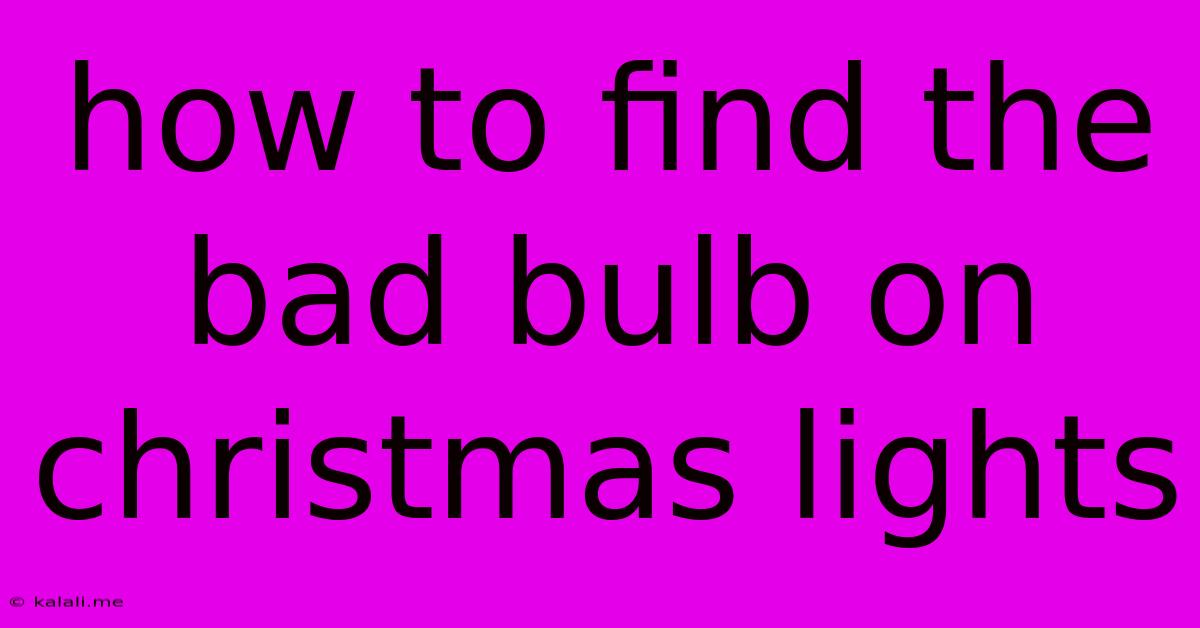How To Find The Bad Bulb On Christmas Lights
Kalali
Jun 08, 2025 · 3 min read

Table of Contents
How to Find a Bad Bulb on Christmas Lights: A Troubleshooting Guide
Finding that one faulty bulb among hundreds of twinkling lights can feel like searching for a needle in a haystack. But don't despair! This guide provides effective strategies to quickly locate and replace the culprit, ensuring your holiday decorations shine brightly. This process applies to both indoor and outdoor Christmas light strings.
The Frustration of Faulty Lights
Nothing dampens the holiday spirit quite like a string of Christmas lights that refuses to fully illuminate. The problem usually lies with a single burned-out bulb, creating a break in the circuit and plunging the entire string, or a section of it, into darkness. Before you throw the whole strand away, let's troubleshoot!
Methods for Finding the Faulty Bulb
Several methods can help pinpoint the bad bulb:
1. The Visual Inspection: The Simplest Approach
Sometimes, the problem is obvious. Carefully examine each bulb, looking for:
- Broken Filaments: A visible break in the filament within the bulb is a clear sign of failure.
- Dark or Discolored Bulbs: A noticeably darker or discolored bulb compared to others may indicate a problem.
- Loose Bulbs: A bulb that is loose in its socket might not make proper contact. Gently tighten any loose bulbs you find.
This method is most effective for smaller strings or if you have recently noticed the problem.
2. The Sequential Testing Method: A Systematic Approach
This method works best for longer strings. Begin by inspecting the string section by section.
- Unplug the lights. Safety first! Always unplug the lights before handling them.
- Start at one end: Examine a small section (approximately 10-15 bulbs) at the beginning of the string. If that section illuminates, move to the next section.
- Identify the Dead Zone: When you find a section that doesn't light up, the bad bulb is likely within that section. Narrow down your search within that particular zone.
- Isolate the Bulb: Once you've identified the non-working section, carefully inspect each bulb within that section to find the faulty one.
This systematic approach significantly reduces the search area.
3. The Bulb-Swapping Method: A More Involved Technique
If the visual and sequential methods fail, try the bulb-swapping method:
- Take a known good bulb: From a working string of lights, remove a bulb that you know is good.
- Replace a suspect bulb: Carefully swap the known good bulb with a suspect bulb in your problematic string.
- Test the string: Plug in the string. If the string illuminates, you've identified the faulty bulb. If not, repeat the process with another suspect bulb.
This method requires extra time and a working string of lights as a source of a known good bulb, but it’s highly effective.
Preventing Future Bulb Failures
While you can't completely prevent bulbs from burning out, you can increase their lifespan by:
- Storing Properly: Store your Christmas lights carefully to prevent damage and breakage. Avoid tightly winding them around small objects.
- Gentle Handling: Handle your lights gently to avoid damaging bulbs or wires.
- Regular Inspection: Before storing your lights away, check them for loose connections or damaged bulbs.
By employing these troubleshooting methods, you can quickly restore the festive glow to your Christmas lights and enjoy the magic of the holiday season without the frustration of faulty bulbs. Remember safety first, always unplug your lights before handling them!
Latest Posts
Latest Posts
-
Please Keep Me Informed To The Amount I Owe You
Jun 08, 2025
-
The Holy Spirit And His Gifts
Jun 08, 2025
-
Internal Fliud Temperature Of Cooling Pipe
Jun 08, 2025
-
Kansas City Strip Steak Vs New York
Jun 08, 2025
-
Clogged Kitchen Sink With Garbage Disposal
Jun 08, 2025
Related Post
Thank you for visiting our website which covers about How To Find The Bad Bulb On Christmas Lights . We hope the information provided has been useful to you. Feel free to contact us if you have any questions or need further assistance. See you next time and don't miss to bookmark.